ROAD
TRIP
an interview with guitar legend
Duane Eddy
interview
written by Robert Silverstein
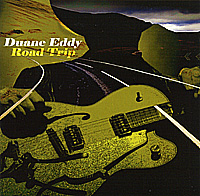 Back
around 1986 or so, guitar pioneer Duane Eddy joined forces with George
Harrison, Jeff Lynne, Paul McCartney and The Art Of Noise, to name
a few, for his long awaited return to form. Hard to believe it’s
taken nearly 25 years for a sequel, but in 2011 Duane returned with
Road Trip—a new studio album co-produced by, and featuring
U.K. guitar aficionado Richard Hawley. Touching on all aspects
of Duane Eddy’s star-studded guitar career, the eleven cut Road
Trip is both nostalgic and modern sounding at the same time. Backed
up by Hawley’s band—including guitarist Shez Sheridan,
keyboard player Jon Trier, Dean Beresford (drums), and
co-producer Colin Elliot—Duane cuts loose on a range of
new original tracks that also features contributions from sax player
Ron Dziubla, who simply wails on several cuts here. Anyone
who appreciated Duane’s amazing comeback in the ‘80s with
Harrison, Macca and Lynne will totally love Road Trip. Duane
may be a little older and a lot wiser, yet when he plugs in his Gretsch
6120 guitar, the trip down memory lane is forever timeless. www.Duane-Eddy.com
Back
around 1986 or so, guitar pioneer Duane Eddy joined forces with George
Harrison, Jeff Lynne, Paul McCartney and The Art Of Noise, to name
a few, for his long awaited return to form. Hard to believe it’s
taken nearly 25 years for a sequel, but in 2011 Duane returned with
Road Trip—a new studio album co-produced by, and featuring
U.K. guitar aficionado Richard Hawley. Touching on all aspects
of Duane Eddy’s star-studded guitar career, the eleven cut Road
Trip is both nostalgic and modern sounding at the same time. Backed
up by Hawley’s band—including guitarist Shez Sheridan,
keyboard player Jon Trier, Dean Beresford (drums), and
co-producer Colin Elliot—Duane cuts loose on a range of
new original tracks that also features contributions from sax player
Ron Dziubla, who simply wails on several cuts here. Anyone
who appreciated Duane’s amazing comeback in the ‘80s with
Harrison, Macca and Lynne will totally love Road Trip. Duane
may be a little older and a lot wiser, yet when he plugs in his Gretsch
6120 guitar, the trip down memory lane is forever timeless. www.Duane-Eddy.com
{Way back in the middle 1990's
I began reading a magazine from England—this being before the
world wide popularity of other U.K. mags such as Mojo and Uncut and
later, The Word. That booklet style quarterly periodical was, and
is still called Pipeline Magazine. Pipeline founder Alan Taylor is
legendary in the surf-rock and the Shadows music world, and fittingly,
Pipeline mag's reviews and articles have always been exclusively dedicated
to the guitar based, instrumental rock and rock ‘n’ roll
scene (at least from a U.K. perspective) started by guitarists such
as Duane Eddy, The Ventures, Santo & Johnny and Hank B. Marvin
and The Shadows back in the late 1950's. No longer just a fan, now
in 2011 I’m actually a contributing writer to Pipeline. Upon
hearing the news of the Road Trip CD, I set in motion the opportunity
to interview Duane Eddy for Pipeline. This was my second interview
with Duane—the
first being for 20th Century Guitar magazine back in late 2007, so
the occasion was much more pointed yet equally entertaining. Duane
Eddy is the perfect candidate for an interview because he’s so
sharp and gracious at the same time. mwe3.com now presents the online
version of the May 12, 2011 Duane Eddy Pipeline Magazine interview.
- Robert Silverstein, September, 2011}
Robert Silverstein: Hey Duane, it’s Robert Silverstein here
in New York.
Duane Eddy: Hey Robert, how’re you doing buddy?
mwe3: How’re you doing man?
Duane Eddy: I’m doing good, is everything all right with you?
mwe3: Yeah, this Road Trip album sounds really great, you must
be thrilled with it.
Duane: I’m very pleased with it, yeah. It just came out of nowhere
really, I got it done and everybody seems to be liking it a lot when
they’ve heard it. I’m pretty happy about that!
mwe3: I know Richard Hawley was involved in producing the album. That
guy’s amazing, how did you hook up with him?
Duane: That was through his manager, who is also my manager. I met
Graham first and then he introduced me to Richard at the Mojo dinner
last year in June. I was over there and Mojo presented me with their
Icon Award and I met Richard at that dinner.
mwe3: I’m just amazed by the English, I’ve been calling
them the curators of rock & roll history. What was it like getting
the Mojo Icon award in 2010, you went to England for that?
Duane: Yes I did, it was a great evening, wonderful, and Richard happened
to get the Album Of The Year that night as well so it was a great
night. A lot of good artists were there and it was fun, I enjoyed
it a lot.
mwe3: So is Road Trip out yet in England?
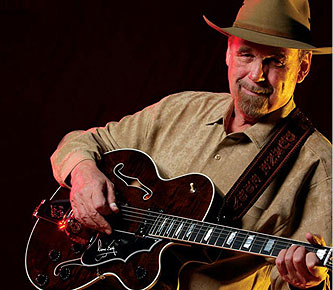 Duane:
It comes out June 20th on an independent label called Mad Monkey,
but EMI is distributing it.
Duane:
It comes out June 20th on an independent label called Mad Monkey,
but EMI is distributing it.
mwe3: How do you think this covers your entire career? I thought “The
Attack Of The Duck Billed Platypus” was really modern sounding.
Duane: Well it is, but I’ve done modern things before and of
course when I started everything I did was modern, although that was
50 years ago and it’s not modern anymore. But then 20 years ago
I did a pretty avant-garde modern record with the Art Of Noise on
Peter Gunn. So Road Trip is just paraphrasing in a sense that
we did a modern thing and we did an old fashioned thing, a gut string
song.
mwe3: Did you write the Road Trip songs, I think Richard was
involved and the band too?
Duane: Yeah, everybody pitched in and helped out and added their two
cents. I wrote a couple and Richard wrote a few and Shez Sheridan
and John Trier too. You know those guys are a great band. They’re
all individual stars in their own right as musicians and they’re
just wonderful, it was a joy to work with them.
mwe3: You took Ron Dziubla to England, I guess you were looking to
create that classic Duane Eddy sound with the wailing sax on a few
of those tracks too?
Duane: Yeah, he does that very well. He knows all the old stuff and
does it just like the old records so we can recreate the old hits
on a show with no problem.
mwe3: When you got the Mojo award last year you also did a bunch of
concerts and there was one at London’s Festival Hall too?
Duane: Yeah we came back in October to do that, made a second trip
over to do a few concerts and the first one was at the Royal Festival
Hall in London.
mwe3: So you were playing some of the new tracks there? Was that with
Richard’s band?
Duane: Yeah it was with Richard’s band but we hadn’t written
the album yet, we did the album at the end of the tour.
mwe3: What did you think about Richard as a guitar player? I know
he actually wrote a song several years ago with Hank Marvin which
was pretty interesting. Was there any discussion about history, some
of the great guitar players who came out of that late ‘50s early
‘60s era? I guess he was pretty influenced by that?
Duane: Yeah I think he was, he heard a lot of Carl Perkins, Sanford
Clark, different ones from the ‘50s. He also had a lot of more
recent influences and people he listened to. He’s a very competent
guitar player, he was a session player for a while in London when
he was younger and of course he was part of the Pulp group with Jarvis
Cocker. He played guitar with them, then he became an artist on his
own and his singing is great. I listened to his albums before I even
met him and I thought the sound was so great it just kinda made me
want to play along with them. I told him that, I said that big open
sound you get on your records just suits me to a “T” - it
just makes me want to jump in and play a little with you. He said
well, we can arrange that. Next thing I know I was doing an album
with him!
mwe3: Wow, and I heard it was coming out on vinyl too?
Duane: Yes, both vinyl and CD.
mwe3: I guess we’re benefiting from all this new technology,
I was amazed at the clarity of “The Duck Billed Platypus”
track—it’s just fantastic.
 Duane:
Richard’s co-producer Colin Elliot is also the engineer and he
did a great job, and then the guy who mastered it was brilliant—Duncan
Cowell.
Duane:
Richard’s co-producer Colin Elliot is also the engineer and he
did a great job, and then the guy who mastered it was brilliant—Duncan
Cowell.
mwe3: I know you’re pretty finicky with the mastering as you
were telling me a few years ago that you were disappointed with the
remaster of the 1987 album you made with George Harrison.
Duane: That’s true, they just don’t do it as well usually.
But of course this isn’t an old project redone, it is a new one
done for the first time and he just put a lot of work into it and
did a magnificent job. Between Colin on the engineering and Duncan
on the mastering the sound definitely deserves to be on vinyl I think.
mwe3: Well if you approve of it then it must be incredibly high quality
because you’re pretty accurate.
Duane: When you hear it you’ll see what I mean, and you’ve
heard "The Attack Of The Duck Billed Platypus"—that
gives you an idea of the quality of the sound of the album.
mwe3: I was talking with Pipeline and I know you also have an album
that you were recording a few years ago with Monroe Jones that’s
been in the vaults for a couple of years.
Duane: Yes I have, it was with Monroe Jones and I’d still like
to get that out. I’m hoping Road Trip does well enough
that maybe we can find somebody interested in putting that one out
because it has some good things about it as well.
mwe3: That was supposed to be called Artifacts Of Twang?
Duane: Yes, but we’ve put that on the back burner for now. We
put it back on the shelf and we’ll leave it there until we see
what happens with this one. We’ve been waiting a long time for
a new album so it would be great to get both of them out! I know,
it would be. I wouldn’t mind, but we’ll see how it goes.
It’s not completely finished up, the one with Monroe. We’d
like to do a few more things to it before we release it, a little
more work on it just to polish it a bit, little things, some string
overdubs.
mwe3: Is that album also instrumental or are there vocal tracks? I
believe there’s one with Phil Everly?
Duane: Yeah, there’s a track with Phil Everly on that one and
a track with Brian Setzer called “That’s How It Was When
We Started To Rock & Roll.”
mwe3: You’re going back to England to play the Glastonbury Festival,
how did that come together?
Duane: According to my manager they asked me to be on the show so
we talked about and I said sure, I’d love to. They set it up
and I’m gonna go do it. We’re probably doing a couple of
other dates too, but I’m not sure.
mwe3: Which guitars are you using mostly on Road Trip, the
Gretsch 6120? I heard they were planning to bring that one out again.
Duane: Yes they are. On the Gretsch Guitars website you can see a
little film about the Gretsch that they’re bringing out. It’s
a beautiful instrument, they’ve patterned it after the original
one I bought back in 1957 that I cut all my hits on. The new guitar
is patterned after that and I used it on the new album. It sounds
just identical to the old one, except that it sounds new again. You
know, the old one’s kinda faded with age...like me! This new
one’s all bright and powerful again like the old one used to
be. I was just totally knocked out by the sound of it, I used it on
the shows over there and I used it on the album. You look at that
little film about my new guitar, I’m playing on it and you can
hear what it sounds like on a live stage too.
mwe3: That was the
animated film, right?
Duane: Right, you’ve seen that already?
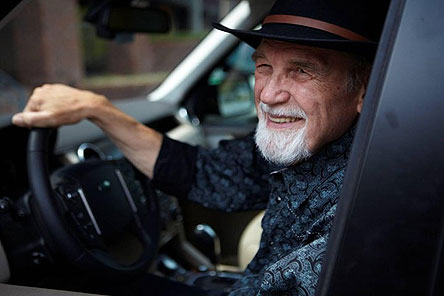 mwe3:
The fella who does the Duane
Eddy Tribute Page for you on Facebook, there’s some great
stuff on that page.
mwe3:
The fella who does the Duane
Eddy Tribute Page for you on Facebook, there’s some great
stuff on that page.
Duane: Tony is a great guy, a really good guy, I really appreciate
all he does. He does a great job on that, you’re right.
mwe3: There’s a lot of cool stuff, easy to access.
Duane: Yeah, he gets stuff I don’t get. I have to go to him and
say do you have this, I’d like to see it.
mwe3: He mentioned you were playing on the Tom T Hall tribute album.
Duane: Yeah, I was backing singers on that one. I did “Sneaky
Snake” with Buddy Miller and “Everybody Loves To Hear A
Bird Sing”. Peter Cooper did the singing on that. I enjoyed doing
both of them and I think we’re gonna do them live down here in
Nashville on the 25th at the Country Hall Of Fame.
mwe3: How’s Nashville been doing lately with the flooding, is
it okay down there?
Duane: We had our big flood on the 1st of May last year, 2010. That
wiped out Nashville in a big way but there was very little news about
it. The Cumberland River crested at 52 feet and wiped out a lot of
businesses and homes. A lot of guys lost their guitars because they
had them stored down by the river. It was a very sad thing, but that
was last year and this year’s another year so we’re moving
forward.
mwe3: I was looking on your Facebook page and you wished a happy birthday
to Bert Weedon. Now there’s a name that most Americans don’t
know.
Duane: No they don’t, but I met him back in 1960 and we’ve
stayed friends through the years. We haven’t been close, but
I’ve followed his career and I guess he’s followed mine
and I plan to look him up when I get back over this time. I can hunt
him down and have lunch with him or something. He’s getting very
old, but so am I!
mwe3: You’re a one of kind, a guitar legend, we gotta save you
guys!
Duane: We lost some great ones recently with Chet Atkins, Les Paul
and a bunch of steel players in the last few years: Ralph Mooney,
Jimmy Day, Johnny Hughey. Just great, wonderful steel players, like
one of a kind you know. And Buddy Emmons has retired so he’s
not playing now. A lot of great musicians are dropping off the planet.
mwe3: Are there any musicians down in Nashville following in their
footsteps, I know Steve Wariner is doing some great stuff.
Duane: He was a big protégé of Chet. Chet loved Steve,
he was like a son to him. Steve’s the sweetest man you’ll
ever meet. Yes and there’s Doyle Dykes who’s following up,
he’s a great finger-picker. Tommy Emmanuel, he’s brilliant.
He’s taken Chet’s thing and taken it a step further—like
Chet took Merle Travis and Les Paul and took it a step further. Tommy’s
really brilliant and so’s Doyle, Doyle’s a great finger-picker.
I just worked with him recently, it’s a thing on his book. It’s
a book with a CD in it and we played this song together in a studio
in town, a beautiful little song he wrote called "The Lights
Of Marfa."
mwe3: These guys are all guitar treasures, you know I just had dinner
with Johnny Farina from Santo & Johnny.
Duane: I knew Johnny years and years ago, sure did...Santo as well.
mwe3: Santo’s retired.
Duane: I don’t blame him, good for him—somedays I wish I
could!
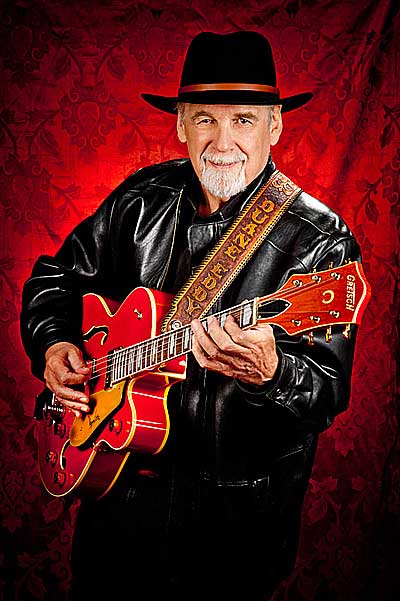 mwe3:
Well I don’t know if you’d want to retire Duane, you’ve
still got a lot of that fighting spirit in you. It’s in your
music, you can hear it.
mwe3:
Well I don’t know if you’d want to retire Duane, you’ve
still got a lot of that fighting spirit in you. It’s in your
music, you can hear it.
Duane: Yeah, what else am I gonna do! I wouldn’t have anything
to do if I retired.
mwe3: Look at Les Paul, he lived to be 94. I met him when he was 87
and he was jumping around like a kid.
Duane: Yeah, he kept working. I saw him a couple of years ago for
the last time. Everybody got together to honour him at the Hall Of
Fame, it was great fun.
mwe3: What about Hank Marvin, have you seen him around recently?
Duane: He bought a house outside of Perth, Australia. I don’t
know if he spends much time down there, but he’s retired several
times and then came back and did one last tour with Cliff Richard
& The Shadows. You try to give it up and say this is it for me,
then time goes by and somebody says hey you wanna go out with us—and
by golly I do! I want to go out again, I want to go play! You forget
how much of it you didn’t like, remember what you did like and
then out you go. That’s probably what happens with these guys,
that’s why they have so many farewell tours, they think they’re
going to give it up but they have to come back and do some more.
mwe3: Well I guess you’re pretty excited about this new album
coming out.
Duane: I am, I’m very excited about Road Trip. I’m
very happy and can’t wait to see how well it does or doesn’t
do. I think it’s going to do surprisingly well, but I could be
wrong.
mwe3: There’s a shortage of guitar legends out there so we have
to make the most of what you’re doing.
Duane: Yeah I think so too, and I don’t expect any big hit singles
or anything out of it but just hope the album generally does well.
I enjoyed working on it so much with Richard and his band. His co-producer
is part of the band too, he’s the bass player. It was great working
with those guys and I enjoyed it so much. I’m hoping the album
does well to show them that what they did counted.
mwe3: Thank God at least the English are picking up on all this history
that’s going on and I’m just happy to be able to read the
interview you did in Mojo and hear the album that you guys did over
there.
Duane: I can’t wait till you hear it and I sure hope you like
it. It looks like I’ll be going over there twice this year. I
love it over there, it’s like a second home to me—it’s
almost like going home. Of course I was born and raised here in America
but my family come from there. Back in 1630 my ancestors came over
from England, about ten years after the pilgrims came. My mother’s
side of the family came over about 1638, which was 300 years before
I was born. So the Eddy family goes way back, and the Cooks—that’s
what my grandmother’s name was. Maybe that’s why I feel
such an affinity for England, because my ancestry is from there.
mwe3: Did you learn where your ancestors lived?
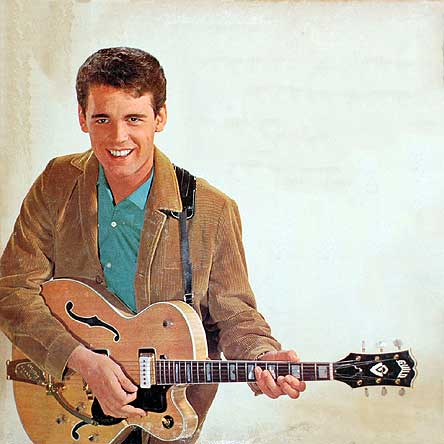 Duane:
Yes, I went by there last summer when I was over there touring—it
was Cranbrook, Kent. My ancestor was the vicar at St. Dunstan’s
from 1571 until 1616 when he died, and his two boys left 14 years
later in 1630. They sailed over on a ship called the Handmaiden to
Plymouth Rock and took up farming. We can trace the whole line of
them from both boys, Samuel and John. Samuel was my ancestor, I guess
that makes me American anyway!
Duane:
Yes, I went by there last summer when I was over there touring—it
was Cranbrook, Kent. My ancestor was the vicar at St. Dunstan’s
from 1571 until 1616 when he died, and his two boys left 14 years
later in 1630. They sailed over on a ship called the Handmaiden to
Plymouth Rock and took up farming. We can trace the whole line of
them from both boys, Samuel and John. Samuel was my ancestor, I guess
that makes me American anyway!
mwe3: The British have such an affinity for American music. The whole
grass is greener thing… I mean when The Beatles came along they
turned all the young kids (like I was back then) onto the great music.
Of course George Harrison was really influenced by you, he played
the Gretsch so he had that sound.
Duane: It just goes back and forth, and I was glad to see that happen
because when I went over there in 1960 their charts were eighty percent
American and twenty percent British and I thought that’s kinda
one-sided. But when I went back in 1963 it was 80 to 90 percent British
and I thought, well, they’re getting their own back, that’s
good. When The Beatles came along my business dropped off, as did
many of the people from my era. That was like the second generation
and I was happy to see them come along because I’d had my five
years and I was exhausted I tell ya—and I still had a couple
more years of recording to do, which I did, for RCA. So I was happy
to see them do that, to conquer the whole world musically speaking.
I think we liked each other because it was mostly the British that
came here in the first place.
mwe3: I guess the Road Trip album is going to be popular all
over the world. Instrumental music, especially when it’s played
by you with that guitar sound, it really transcends any language barriers
or limitations.
Duane: Yes it does, I never had a problem with anybody unable to translate
my records! Even South America, I’ve had hits down there too!
That was 50 years ago so I doubt whether anybody remembers me there
now, I’ll have to start all over.
mwe3: Do you think that manager Graham Wrench and Mad Monkey Records
are going to do enough for the record worldwide?
Duane: Here’s a thing about Graham, I don’t count him out
on anything, he’s a pistol that one. He did great by me last
year and he’s got one of the best record men in the business.
He’s already doing amazing things with it. We’re already
in the Top 10 in a couple of charts on web sites where they take advance
orders, we’re right between Foo Fighters and Lady Gaga! I figure
he may just keep right on doing it, once he knows he’s got the
product he’ll be able to run with it.
mwe3: Are you looking to sell more downloads or physical product?
Duane: A lot of people like downloads because of the convenience.
They pay for them and somebody gets paid. I even get paid on some
of those, so I’m not unhappy about that. The only thing is you
don’t do as well because they only download one track or two
instead of the whole album.
mwe3: It changes the concept of the album when you only download one
track, you don’t get the full impact.
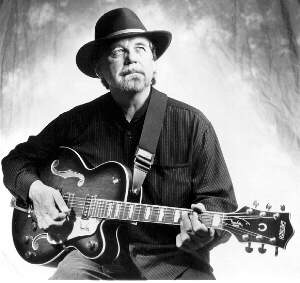 Duane:
You don’t get the full impact and I think in this case, with
this album, I’ve listened to it a few times and I start at the
beginning and go all the way through it to the end—and I never
used to do that. It’s not too long and it’s an interesting
experience that way. It’s great...I think I would miss it if
it were a track or two gone. It’s like one complete entity, it’s
better to listen to it that way I figure—you appreciate it more.
Something I heard that Graham’s doing, which is a novel idea
and a brave one, he’s putting a CD in with each vinyl album so
you get both when you buy the vinyl. I don’t know if that’s
true but I believe it is, I’m not sure, and there are probably
a limited number of vinyl albums. But that’s what I heard anyway,
and I think it would be a good idea if they are doing it. Being amongst
record companies for the past 50 years I’ve observed a lot of
things. A lot of their problem was that they wanted to control the
artist, which they really couldn’t do that well. They wanted
to control them and make all the money. They wanted them or their
buddies to own all the publishing. When artists found out they could
have their own publishing, the record companies, or the big publishing
companies, lost them. The artists had them instead, or their managers
or producers. The artists started their own publishing companies and
the record companies didn’t like that, and then they wanted the
costs to go down all the time. Anytime you had a hit album it paid
the costs for everybody, plus they took the costs off you before they
paid you any royalties anyway. So they just put themselves out of
business with all the technology and then turning it over to the engineers,
you should never do that. Not that there’s anything wrong with
engineers, but if you give them too much power, like anybody, they’re
going to do it strictly their way and you can’t get it done any
other way. It’s all got to sound like it does, it’s all
got to sound the same. They compress everything 100 percent and everything
sounds the same as the next album. There’s some little difference
but it’s very hard when you compress everything. It does make
it a little louder and sharper, but it makes it all sound like every
other album. Everything’s got the same high end and the same
low end and the same middle range. It’s like that song I did
with Phil Everly on the Artifacts Of Twang album that’s
not out yet. I went in the studio one day and they’d done a mix
on it. They asked “What do you think?” But with that compression
on Phil, because he was singing with himself he sounded like two guys
from across the street. He didn’t sound like Phil Everly, he
didn’t have that Phil Everly sound, and my guitar didn’t
have my sound—it could have been any guitar player. I said take
all the compression off of Phil and take it all of it off of me. Really,
seriously? I said yes please I’m deadly serious, please take
it all off, every iota of it. They said okay, all right. I twisted
a few arms and got it all off there and played it again and there
was Phil sounding like Phil and there was me sounding like me. I didn’t
care about the rest of it so much, I wanted our sound to be there
but it helped the whole thing sound even better. Anyway that’s
another thing I want to do, I want to remix it without compression
of any kind. But whatever compression they had on this Road Trip
album it’s very little, that’s why it sounds so pure and
good.
Duane:
You don’t get the full impact and I think in this case, with
this album, I’ve listened to it a few times and I start at the
beginning and go all the way through it to the end—and I never
used to do that. It’s not too long and it’s an interesting
experience that way. It’s great...I think I would miss it if
it were a track or two gone. It’s like one complete entity, it’s
better to listen to it that way I figure—you appreciate it more.
Something I heard that Graham’s doing, which is a novel idea
and a brave one, he’s putting a CD in with each vinyl album so
you get both when you buy the vinyl. I don’t know if that’s
true but I believe it is, I’m not sure, and there are probably
a limited number of vinyl albums. But that’s what I heard anyway,
and I think it would be a good idea if they are doing it. Being amongst
record companies for the past 50 years I’ve observed a lot of
things. A lot of their problem was that they wanted to control the
artist, which they really couldn’t do that well. They wanted
to control them and make all the money. They wanted them or their
buddies to own all the publishing. When artists found out they could
have their own publishing, the record companies, or the big publishing
companies, lost them. The artists had them instead, or their managers
or producers. The artists started their own publishing companies and
the record companies didn’t like that, and then they wanted the
costs to go down all the time. Anytime you had a hit album it paid
the costs for everybody, plus they took the costs off you before they
paid you any royalties anyway. So they just put themselves out of
business with all the technology and then turning it over to the engineers,
you should never do that. Not that there’s anything wrong with
engineers, but if you give them too much power, like anybody, they’re
going to do it strictly their way and you can’t get it done any
other way. It’s all got to sound like it does, it’s all
got to sound the same. They compress everything 100 percent and everything
sounds the same as the next album. There’s some little difference
but it’s very hard when you compress everything. It does make
it a little louder and sharper, but it makes it all sound like every
other album. Everything’s got the same high end and the same
low end and the same middle range. It’s like that song I did
with Phil Everly on the Artifacts Of Twang album that’s
not out yet. I went in the studio one day and they’d done a mix
on it. They asked “What do you think?” But with that compression
on Phil, because he was singing with himself he sounded like two guys
from across the street. He didn’t sound like Phil Everly, he
didn’t have that Phil Everly sound, and my guitar didn’t
have my sound—it could have been any guitar player. I said take
all the compression off of Phil and take it all of it off of me. Really,
seriously? I said yes please I’m deadly serious, please take
it all off, every iota of it. They said okay, all right. I twisted
a few arms and got it all off there and played it again and there
was Phil sounding like Phil and there was me sounding like me. I didn’t
care about the rest of it so much, I wanted our sound to be there
but it helped the whole thing sound even better. Anyway that’s
another thing I want to do, I want to remix it without compression
of any kind. But whatever compression they had on this Road Trip
album it’s very little, that’s why it sounds so pure and
good.
mwe3: Like I said, if you’re happy with it it must be good because
you have pretty high standards. I guess the focus now is on going
back to England and trying to get as much press for the Road Trip
album?
Duane: Yeah, that’s what I’m going over for next. Maybe
do a couple of little concerts before I do Glastonbury so we can get
used to each other again and all that good stuff, and maybe do a little
different show than Glastonbury. So with the promotion of the album
and the guitar which I’m also promoting, I’m doing interviews
with Guitar magazine, and doing Glastonbury—it’s enough
for this old man!
mwe3: That’s a lot of work for a young man too.
Duane: Sure it is, I did it as a young man and I wore my butt out
then so I don’t know how it’s going to do it to me now.
I’ve got to pace myself, I know that.
mwe3: Well you’ve got the experience, you know how to deal with
these people.
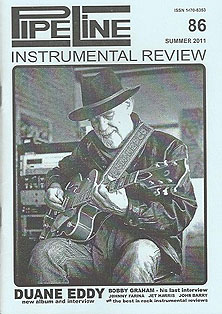
Duane: Oh yeah, I don’t have any problem with the interviews
and talking to people. I enjoy that for the most part. It gets to
be hard work when you do several all day and you have to repeat yourself
and you think: did I say this yet, or did I say this twice, or was
that in the last interview?
mwe3: There are so many more avenues now with the online world, the
magazine world is still going, the download world, the CD world, even
young kids who missed vinyl records are going back to vinyl. That’s
where your experience comes in, it’s a lot of challenges to deal
with all these things.
Duane: But if I just take it easy and deal with them one at a time
I should be able to handle it. Like I always say, if they’re
asking questions about me I know the answers! The business has changed
an awful lot and I see a whole new world opening up for entrepreneurship
and for music and everything else. Because young kids who are wanting
to make music, they don’t want to do it by the formula. Like
Richard Hawley, he’s making music he loves. He doesn’t do
it to sell records, although it’s obvious you’ve got to
sell a few so you can get to make another album. But he does, he sells
very well in fact. So he’s making music he loves, he’s not
making the formula stuff and so many others are doing the same thing.
So I think that’s going to change, I think we’re going to
have some good music in the next 20 to 30 years. But it may take a
couple, three, four or five years for it to really kick in.
mwe3: You’ve got to spread the news far and wide, but that’s
the beauty of the internet.
Duane: I get young kids coming to my concerts who have discovered
me through the internet or somehow, and they know what I’ve done.
It’s amazing. I do know that if somebody loves one of these tracks
and they put it on You Tube and it goes viral I could have 20 million
sales the next day. I don’t expect that to happen, but you never
know!
Thank you to Duane and Deed Eddy @ www.Duane-Eddy.com
and Alan Taylor and George Geddes @ www.PipelineMag.co.uk